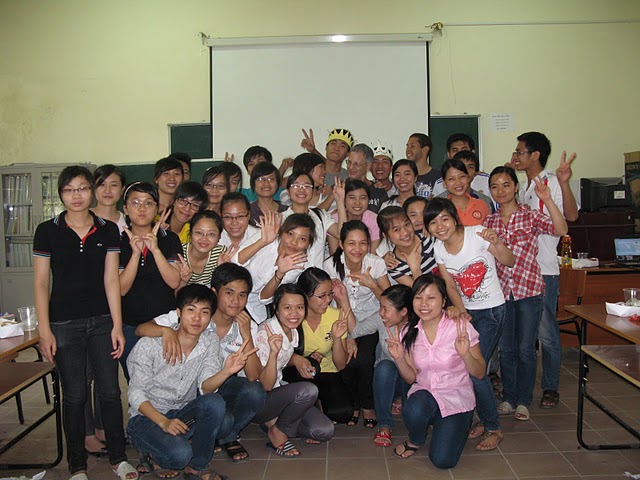In Vietnam the war is called the American War because—and this surprised me—a lot of people do not know why we came to fight in their country. In 1954, Ho Chi Minh won the election—but the results were not allowed. The nation was given two years to prepare for new elections. In 56, the north expected an open and honest election (and the national feeling was that Ho Chi Minh would win again) but our country convinced the international community to cancel them. This caused a lot of angst and negativity between the south and the north. Many Vietnamese believe the north would have won that election, but we’ll never know because it didn’t take place.
At the Ha Noi University of Agriculture, a few professors asked me point blank why we had to fight the war in Viet Nam. They really did not know why we had come to Viet Nam to have a war—and then they asked me why we did not help them recover after we left. I asked what their biggest concern was. Their answer surprised me:
During the war we sprayed large areas with Agent Orange and even today—forty years later—it continues to cause huge problems in the country. Why didn’t our nation come forth and help clean up this incredible environmental holocaust?
Below is a map showing the large areas that are still damaged by Agent Orange.
People still live in these dead zones and even though the government is trying to help the people, it cannot afford even forty years later to relocate them.
“People living there suffer terrible diseases because of the effect of Agent Orange,” according to Professor Nguyen Thi Hoa (Department of Botany, Hanoi University of Agriculture). “Given the right resources, we feel we can solve a lot of the problems in this area. The ground is horribly contaminated and so are a lot of the people.
“Many of the children conceived from individuals who came in contact to this chemical, have children with gross problems. Even with genetic counseling, whole families are made up of individuals who cannot support themselves. The Vietnamese government has to support them because their genetic make-up has caused major mutations and many of them are disfigured in body and mind. Even the third generation has problems—the mutation has passed through three—perhaps four--generations. I say perhaps because the data we have collected only goes through three generations, not four.“
Professor Nguyen believes if she is given a grant of ten thousand American dollars, she can make a positive impact in solving the problems. She has created a budget to show how she would utilize the money:
Team members: 5 ($100 per day, 5 days): $2,500
Witnesses and documentation of testimony: $1,500
Families of Agent Orange victims: (6) $1,500
Local guides: 2 ($200$ per day): $1,000
Train tickets (round trips for team): $1,500
On site transportation (45 seats, $250 per day) $1,250
Administrative expenses: $250
Miscellaneous expenses: $500
Total: $10,000
Ten thousand American dollars to research solutions to a problem that has been going on for three—perhaps four—generations, a problem our nation caused—and one of the most surprising insights into this ecological disaster is that most of the red zones are in the south—our allies in the war the Vietnamese call the American War.
By the way, I should mention that the Vietnamese people and their government tried to get assistance from our nation through the courts, but every attempt was met with dismissal on all counts. Nonetheless, in 2011 Viet Nam has forgiven everyone who has fought on its soil. Unlike our nation, an entire generation of Vietnamese children has grown up without their nation being actively involved in any war. A generation of peace, a willingness to forgive—and yet one of the largest ecological holocausts continues to hinder the people and the nation of Viet Nam.
Victims of Agent Orange
The man in these photos is Tran Quoc Hoan, an athlete who was awarded 18 medals in the national paragames. He was born in 1975 and suffers the effects of Agent Orange because his father fought in the Quang Tri battlefield from 1968 to 1973. He is now living in Dong Ha – Quang Tri.
This photograph is of Nguyen Huu Thinh, who now lives in Hai Duong province. He is a victim of Agent Orange because his father was a soldier in the Southern Vietnam battlefield.
The individual in the following photographs is Nguyen Minh Phu, a boy who was born without arms. He was born in 1993. His father joined the battlefields in the South of Vietnam from 1972 to 1985. He got married in 1987 and gave birth to four children. Three of them are severely handicapped because of the effects of Agent Orange. Phu is the 3rd child in the family. Although he lacks his arms, he is a very good at school. He uses his legs to do most things--even writing as you can see in the photo. He would like to be a translator or an IT engineer because these jobs are suitable for his condition.
###
For more information, please visit the Project Agent Orange home page at: http://www.projectagentorange.com/










